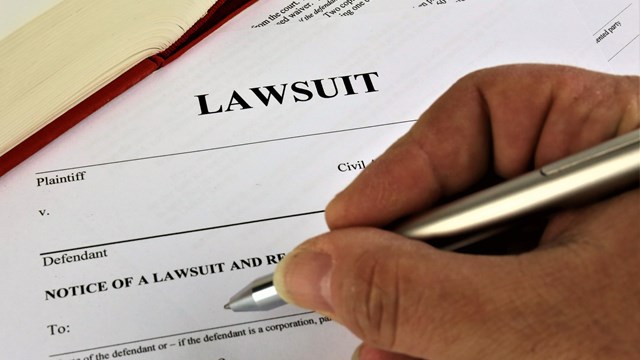Lawsuits are an unfortunate, expensive fact of life these days—chances are that at some point in your lifetime you’ll be involved in one to at least some degree. In you live in a condo or HOA, legal issues arise all the time. Sometimes it’s the resident who sues the building for some grievance, other times it’s the building that goes after an individual resident. Maybe Jane Doe in unit 3A is six months behind on common charges, or John Doe has consistently caused all manner of trouble since moving into his apartment and feels that the community's rules just don't apply to him.
Clearly action needs to be taken, but a lawsuit within a building community makes for a delicate situation, often roiling up bad feelings and costing everyone money and time. Handling a suit properly from the start can help minimize these negative outcomes.
First Moves
So what is the first thing you should do when you get the word that a legal action has been brought against you or the board? Being served a summons can cause great consternation for anybody, but the key thing for board members, managers and residents alike, say the legal professionals, is not to panic or stick one's head in the sand. "Doing nothing is the worst possible thing you could do," says Fran McGovern, of McGovern Legal Services, LLC in North Brunswick., "because if service has been made and no action has been taken by the defense, the plaintiff can enter default judgment."
The wiser course of action is to just take a deep breath, sit down, and read the paperwork you've been sent. Once you have an idea what it’s all about, it’s time to talk to your or your building’s attorney. "Some people think that involving lawyers makes things worse," says Ronald L. Perl, an attorney with Hill Wallack in Princeton, "and in some cases that is justified—but association attorneys should be problem solvers."
Once the relevant documents have been received by counsel, the discovery process begins.
"Discovery is the process by which each side explores in great detail the allegations made in the complaint, as well as the defenses asserted by the defendant," says Thomas Giaimo, an attorney based in Rumson who specializes in condominium and homeowner association law throughout New Jersey. "Discovery includes the production and review of documents served pursuant to a formal demand (a subpoena); answering written questions under oath, (referred to as interrogatories); as well as sworn testimony under oath (depositions). Initially, legal counsel's role is to ascertain the validity of the claim and to provide guidance to the governing board as to the most appropriate response. Those responses can range from settling the claim, filing an answer to the complaint and/or filing a counterclaim against the claimant, and/or impleading another responsible party into the action."
Other Considerations
There are insurance considerations as well. The pros say that by not providing timely notification of a potential loss and of a lawsuit to your HOA insurer, you run the risk of having your coverage dropped. "In most instances, claims filed against the association are covered by one insurance policy or another,” says Giaimo. “All policies require their insured—in this case, the association—to immediately inform the insurance carrier that a claim has been filed. It is critical that this notice be provided to the carrier as soon as is practical so as not to provide them with an opportunity to deny defending the claim based on timeliness."
Two other issues the pros bring up is the obligation to preserve evidence, and the importance of confidentiality when it comes to lawsuits. More than one attorney interviewed for this article stressed that once a suit has been filed, instructions should go out to all personnel at the managing agent's office as well as members of the board that emails should be saved, no related memos or documents should be destroyed, and any communications relevant to the case should be preserved. This is an important consideration, because not only can missing documents hinder the legal process and add to its cost, they can give the appearance of shady behavior, even if that's not at all the case.
And finally, once a legal proceeding is underway, legal professionals say it's best to keep any and all relevant details strictly confidential. Once you’ve spoken with your building’s attorney and insurance company, don’t talk to anyone else. Once the case is settled and closed, certain facts may be discussed, but until then it's nobody else's business, and divulging information can be damaging to both the process and the outcome.
Different Suits for Different Groups
It's not at all uncommon for disagreements to flare between neighbors in a building or HOA. In high rise buildings, for example, things like noise transmission is a perpetual issue, says McGovern, adding that's not to say that lawsuits between neighbors don't often spill over and involve the board and association itself. "If the case is unit owner versus unit owner, the association will not get involved, but often the failure [of the board] to enforce the governing documents will make the association subject to a related lawsuit."
When it's a case of a resident suing the HOA, there are a couple of things that should be avoided, says Giaimo. If the defendant is an HOA or board, "No statements should be made to the attorney representing the claimant and/or the claimant's insurance carrier without assistance from the association's counsel." He also strongly advises against an HOA attempting to represent itself in legal proceedings.
"Another thing that the association should do is go out and investigate the charges," adds McGovern. "For example, in a trip-and-fall case, they should go out and investigate the source of injury. If it was a vertically displaced concrete slab and someone tripped over it, the association should determine whether there is a dangerous condition out there, and if there is, the association, in consultation with the attorney, should take steps to remedy it. That way you don't have another claim on the back of the first."
Sometimes, it's the association who must move against an individual residents. "This typically happens when the unit owner is non-compliant with his or her obligations as dictated by the community's governing documents,” says Giaimo. “Noncompliance is typically found in areas involving a failure to remit fees and assessments levied by the association, or failure to abide by the community's rules or seek association approval for a modification to a limited common element such as a deck or patio."
Alternative Dispute Resolution
If back-and-forth between attorneys doesn't resolve an issue and more legal action is threatened, there are a few more options to exhaust before Judge Judy gets involved. Some of these options are actually written into law, such as the case with alternative dispute resolution, or ADR. In ADR, both sides meet with a neutral mediator to try and work the problem out between themselves to a mutually acceptable solution. It’s a relatively simple, confidential process; the mediator listens to both parties and brokers a solution that both sides agree upon.
According to McGovern, "If alternative dispute resolution (ADR) has not been offered, courts will, at their discretion, dismiss the case and send it back to ADR to try to work out the dispute before the case can be taken to court. Since people live together in the community association realm, there is a strong policy of working things out amicably, because they are neighbors. Also, with the growth of HOAs in New Jersey, the less serious issues began to clog the courts, so [ADR] provides a process by which these cases can be disposed of without coming to court."
"I like to say that if your association is in court all the time, you may have the wrong lawyer," says Perl. "In fairness however, attorneys aren't always the ones that cause litigation to begin, but if you hire an attorney who is known to be a problem-solver, that attorney will try to find ways to help the parties solve their own problems by way of negotiation and compromise. Associations are well-suited for mediation as well, and a good attorney can help solve thorny problems by implementing that kind of dispute resolution."
There are a few stipulations with ADR, however. "In New Jersey, the right to invoke ADR lies with the unit/homeowner—not with the association," says Giaimo. "In addition, ADR is only required in housing-related disputes in New Jersey. If for example, an association's complaint against a unit owner is for an alleged failure to pay fees and assessments, the association does not need to offer the involved unit owner ADR. It should also be noted that if ADR is invoked and results in a resolution unsatisfactory to the unit owner, the unit owner is not prevented from seeking a judicial remedy in court."
"Another form of ADR is formal arbitration," adds McGovern, "where someone is appointed to try to resolve the conflict. An arbitrator tries to determine what the outcome of the trial would be, while mediation is more of a sit-down between the parties to try to get them to resolve the dispute on their own. The case can still go to trial after these processes."
According to Eric Tuchmann, general counsel for the American Arbitration Association, unlike a judge, a mediator has no authority to bind a party to an outcome. If a solution is reached, a binding agreement is often drawn up, but the mediator has no official power to create that agreement. It must come through the disputing parties. "He or she is there to help them come to their own solution," Tuchmann says, adding that some forms of ADR “Have very limited appeal rights, which makes it an attractive feature for some people because that means they're not going to have to go through 20 years of appeal [like in litigation.]” That's usually not necessary, however. According to Tuchmann, ADR has shown to be effective in preventing lawsuits up to 85 percent of the time.
Short- and Long-term Costs
Lawsuits are notoriously expensive. Involvement in one can seriously deplete financial resources long before a judgment is made. "If their defense is covered by insurance, it may not cost the association anything," says McGovern. "However [a lawsuit coverage claim] will impact the association's insurance fees in the future."
On the other hand, "A simple matter of rule violation can run from $3,000 to over $10,000 for either the HOA or the resident not covered by insurance," says McGovern. "More complicated cases can go up to hundreds of thousands of dollars. People forget that it doesn't involve just attorneys' fees. You may have to pay fees for expert testimony: an engineer, management practices expert, or a forensic accountant, for example."
"Ninety percent of all litigation which is filed does not result in a trial," adds Giaimo."The costs and expenses to be incurred by both the plaintiff and defendant quite often portend against presenting issues of fact to a jury and/or judge for determination."
"Unfortunately, there is nothing an association can do to preclude an individual from filing multiple lawsuits against it," Giaimo continues."In each and every instance, the association must go through the proper protocols for defending the claim. However, individuals who have a history of filing multiple claims against an association are not viewed favorably by the courts."
The habitual lawsuit-filer may face other obstacles—if he or she is trying to get into a new HOA, for example. "Most litigation documents are available at the courthouse," says McGovern. "A co-op board might take note of a person with a long history of litigation. Many courts hold documents for six years, and sometimes longer."
In addition, there are a couple of other moves that can discourage frivolous lawsuits. A defendant's attorney can generate a letter saying that if the judgement determines that the claim is frivolous, then they will ask for their attorney fees to be paid by the plaintiff.
"The motion of summary judgment is where the attorney for the defense typically argues to the court that even if the claims of the plaintiff are true, the law does not provide a remedy," says McGovern. "For example, let's say there is cracked concrete in front of the building. If Mr. Jones sues for damages due to negligence, but Mr. Jones was never actually injured, then there has been no damage, and the court would dismiss the case."
In the End
At the end of the day, nobody wants to be on the receiving end of a lawsuit, frivolous or otherwise. For HOA boards and managers, steering clear of legal trouble means keeping lines of communication open between community administrators and residents, and acting promptly to correct problems when they arise. To do otherwise invites suspicion, frustration and resentment—all of which can make people more apt to “lawyer up” and sue when the "final straw" comes up, whatever it may be.
For residents, the formula for avoiding lawsuits is similar: practice good manners, follow your association's rules, and be a good neighbor. There will always be one or two people in a community that just can't seem to bring themselves to get along with their board and fellow residents, but even so-called troublemakers sometimes have legitimate complaints. By giving due respect and attention to residents' concerns and grievances, a board/management team can go a long way toward creating a more peaceful, harmonious community.
Lisa Iannucci is a freelance writer, published author and a frequent contributor to The New Jersey Cooperator. Additional writing and research by Hannah Fons and David Chiu.







Comments
Leave a Comment